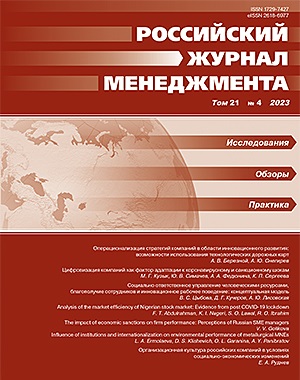Analysis of the market efficiency of Nigerian stock market: Evidence from post COVID-19 lockdown
DOI:
https://doi.org/10.21638/spbu18.2023.404Abstract
Goal: to assess the efficiency of the Nigerian stock market after the COVID-19 lockdown which had substantial impacts on African countries, including their local stock markets.
Metodology: the empirical study was conducted by employing the GARCH models with three different error distributional assumptions with data covering the timeframe from June 2020 to December 2022.
Findings: the results indicate that during the post COVID-19 period, the Nigerian stock market demonstrates inefficiency in the weak form but efficiency in the semi-strong form.
Originality and contribution of the authors: this is the first empirical study in Nigeria that presents the comprehensive overview of market efficiency in the post COVID-19 period. The authors’ emphasis in the study that the levels of market efficiency are independently determined forms; the semi strong form efficiency can be attained without week form efficiency. The study emphasise the importance of implementing strict oversight, restrictions, and regulations to discourage excessively negative noise (rumour) traders and investors from engaging in short selling for profit especially in equities held by institutional investors.
Keywords:
Nigeria, market efficiency, stock market, COVID-19, GARCH
Downloads
References
References
Downloads
Published
How to Cite
Issue
Section
License
Articles of the Russian Management Journal are open access distributed under the terms of the License Agreement with Saint Petersburg State University, which permits to the authors unrestricted distribution and self-archiving free of charge.





